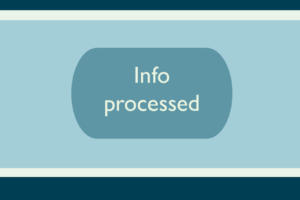
How to Avoid the Frantic Search for Important Papers
Have you ever made a frenzied search for necessary information? It is frustrating and exhausting! What if I can show you an alternative?
I can still remember one day (a number of years ago) when I planned to take advantage of a free loaner car while having mine serviced. My current car insurance card was needed to complete the paperwork. It was in my wallet exactly where I knew it would be.
Then I heard, “Do you have a more current one? This one has expired.”
I was shocked! How could I have overlooked such a crucial piece of mail? Fortunately he was very kind and loaned me the car anyway.
When I got home, I went straight to the folder where car insurance information is filed…and was shocked (again!) because there was NO current car insurance card.
Since a car insurance card is required by law, a frantic search ensued. I found it… in a stack of papers to file! Since I have a specific folder for car-related documents, I guess that I was in a hurry and placed it on the pile thinking I would take care of it later….except later didn’t come and another piece of paper ended up on top of the card.
Bottom-line, when I decided not to process the insurance card the moment it came in (putting the card in my wallet and the remaining paperwork in the file), I wasted much more time and energy in the end.
Note: nowadays I could download it from my online account. Fortunately, I use a password manager. Otherwise, I might lose time finding my log-in information.
This reminds me of my Calm the Information Chaos webinar. Early on I asked
How many of the following documents could you locate in two minutes? It doesn’t matter whether they are digital or in hard copy, in your possession or in a common location.
- Birth Certificate
- Phone number of your Primary Care Doctor
- Current vaccination record
- Next medical appt (if you have one)
- Medical insurance card (or copy)
Did you panic when I asked the question? If so, you’re in good company.
Why did I do this exercise? Because the reality is that you need to be able to easily access important personal documents!
Here are three factors to consider regarding vital records:
-
There is no right or wrong way to store crucial medical information. What’s most important is the ability to locate them when you need them.
-
Always make time to process your most essential data. While it’s best to deal with all papers, emails, and texts as they come in, life can get in the way. So if you’re short on time, tackle the critical ones first.
-
Remove and replace, as applicable. When I finally found my new car insurance card, I shredded the previous one. I had no need for the expired one. Obviously, there are some documents, such as birth and death certificates, that don’t fall into the “remove and replace” category.
You’ll find more in-depth strategies for organizing health-related data in my post How to Organize Medical Information So You Can Easily Answer Health-Related Questions. No one has time or energy for a frantic search for critical information!



